

Mining the internet for linguistic and social data: An analysis of ‘carbon compounds’ in Web feeds. What are Most and Least Shared Words on Facebook? (RESULT) Internet Techies. Facebook is having large audience of approx 400 million active users.
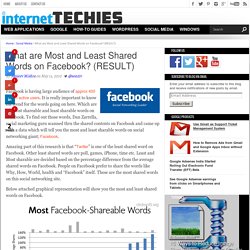
It is really important to know the trend for the words going on here. Which are the most shareable and least sharable words on Facebook. To find out those words, Dan Zarrella, social marketing guru scanned thru the shared contents on Facebook and came up with a data which will tell you the most and least sharable words on social networking giant; Facebook. Amazing part of this research is that “Twitter” is one of the least shared word on Facebook. Other least shared words are poll, games, iPhone, time etc.
Below attached graphical representation will show you the most and least shared words on Facebook. [via] NEW WORDS IN SOCIAL NETWORKING SITES : FORMATION AND MEANING « Mengerti akan hidup. The word ‘facebook’, for example, is new word which popular and spread widely after its popularity around the world.
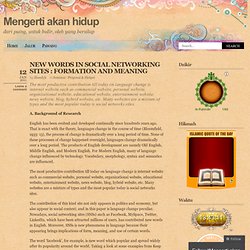
Taking a look at some examples from Keep Up-to-Date (BBC’s language leraning program) released, the word ‘facebook’ is formed from noun to verb. According to definition of word and verb, it is noun because it is a word that refers to a thing, and verb because it expresses an action, an event, or a state. On the verb form it has at least three forms. Each form has its own meaning depends on place of use. Explaining the meaning of the word, its can be seen in a structure such as “I’ve just facebooked the photos from my summer holiday.”.
On the other form, while we are ‘facebooking’ or ‘myspacing’ we may also find ourself ‘commenting’ (writing a comment on someone’s Facebook or MySpace page), as in this example: “I commented Ahmad’s that he should come to the masjid on Friday.” In line with previous researches, there are many researches about new words. B. C. D. E. F. On the front lines of Twitter linguistics. The Linguistics of ReTweets. I’ve done a bunch of research into the characteristics of ReTweets in an effort to understand what makes them viral.
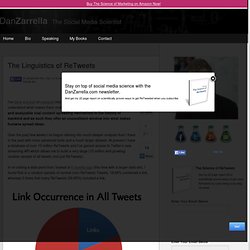
ReTweets are the first entirely observable and analyzable viral content spreading mechanism in the history of mankind and as such they offer an unparalleled window into what makes humans spread ideas. Over the past few weeks I’ve begun delving into much deeper analysis than I have in the past with more advanced tools and a much larger dataset. At present I have a database of over 10 million ReTweets and I’ve gained access to Twitter’s new streaming API which allows me to build a very large (10 million and growing) random sample of all tweets (not just ReTweets). In re-visiting a data point that I looked at 6 months ago (this time with a larger data set), I found that in a random sample of normal (non-ReTweet) Tweets, 18.96% contained a link, whereas 3 times that many ReTweets (56.69%) included a link.
First up is the more “Freudian” Regressive Imagery Dictionary (RID). Language barrier limits European Internet users, study shows. According to a new study released Wednesday by Eurobarometer, the public opinion research wing of the European Commission, over half of EU Internet users occasionally use a language online that is not their native language.
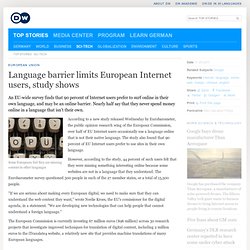
The study also found that 90 percent of EU Internet users prefer to use sites in their own language. However, according to the study, 44 percent of such users felt that they were missing something interesting online because some websites are not in a language that they understand. The Eurobarometer survey questioned 500 people in each of the 27 member states, or a total of 13,500 people. "If we are serious about making every European digital, we need to make sure that they can understand the web content they want,” wrote Neelie Kroes, the EU's comissioner for the digital agenda, in a statement. Dr Michele Zappavigna - Department of Linguistics. PhD Sydmichele.zappavigna@sydney.edu.au michele.zappavigna[at]sydney.edu.au +61 2 9036 5097Room 243, Transient Building F12.
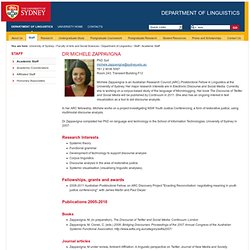
Internet linguistics. Internet linguistics is a sub-domain of linguistics advocated by David Crystal.
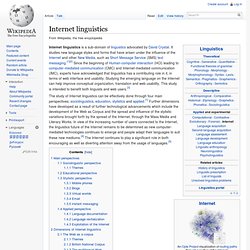
It studies new language styles and forms that have arisen under the influence of the Internet and other New Media, such as Short Message Service (SMS) text messaging.[1][2] Since the beginning of Human-computer interaction (HCI) leading to computer-mediated communication (CMC) and Internet-mediated communication (IMC), experts have acknowledged that linguistics has a contributing role in it, in terms of web interface and usability. Studying the emerging language on the Internet can help improve conceptual organization, translation and web usability.
This study is intended to benefit both linguists and web users.[3] Main perspectives[edit] David Crystal has identified four main perspectives for further investigation – the sociolinguistic perspective, the educational perspective, the stylistic perspective and the applied perspective.[2] The four perspectives are effectively interlinked and affect one another. David Crystal - Internet Language. Estimating Linguistic Diversity on the Internet: A Taxonomy to Avoid Pitfalls and Paradoxes. Topical index of Internet linguistic resources.